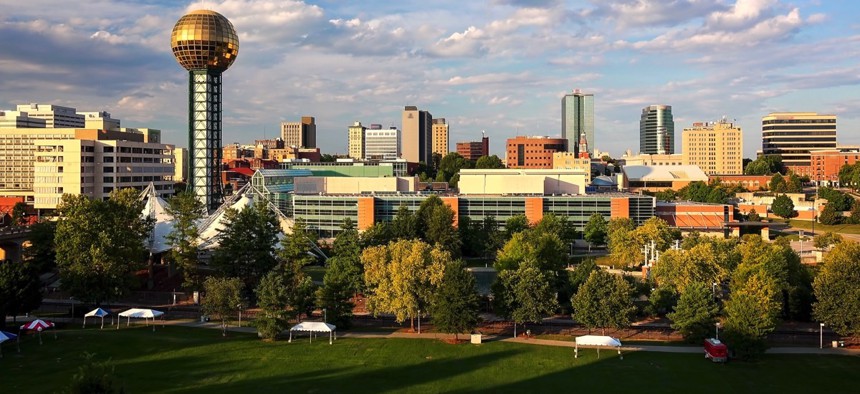Cities Should Meet Their Makers

Knoxville, Tennessee
Often overlooked small-scale manufacturers may prove the perfect fix for vacant corridors. Micro-businesses can bolster local economic resilience, if cities know where to find them.
City leaders aren’t paying enough attention to their local maker communities, which present opportunities for redevelopment of vacant corridors and job growth, according to a National League of Cities report released Friday.
Small-scale manufacturers make tangible goods that are replicable, packable and sellable—often online or wholesale—and they’re not dependent upon foot traffic, which makes them good first additions to new areas.
Supportive business environments allow the small production economy to flourish, particularly when they’re inclusive, and micro-businesses further bolster local economic resilience, if cities know where to look.
“At the most basic level, they just need to find a few business owners who make goods,” Ilana Preuss, the founder of Recast City, told Route Fifty by phone.
E-commerce website Etsy, a coauthor of “Discovering Your City’s Maker Economy,” boasts 1.9 million sellers in nearly every U.S. county, and its Maker Cities program aims to bring them to storefronts because many are going it alone. Micro-businesses may be comprised of a single proprietor and tend to max out at 20 employees, making them easy to overlook.
Cities can find makers at craft markets, and the holiday season is rife with them. Many live in the community selling part or full time and are connected to faith-based or cultural civic organizations.
“Fabrication tools like 3D printers, computer-aided design (CAD) and laser cutting machines are costly but can be a game-changer for a maker business,” according to the report. “Sharing those resources in co-ops or makerspaces can be essential to the growth of their business.”
Recast City consults with municipalities and real estate agencies on incorporating small-scale manufacturing into community redevelopment efforts, recently helping Knoxville, Tennessee use industrial and commercial micro-businesses as a catalyst for reinvestment in a target neighborhood close to downtown.
Many cities eyeing their local maker communities have a previous history with manufacturing, while others want to diversify the types of small businesses in their economic development pipeline, as well as their tenant base.
Mapping and convening the existing maker community is the logical next step, inquiring about their needs without making assumptions.
Economic and land-use policies may need to be altered and developers incentivized to set aside space for makers. State or local sales tax exemption programs may also prove beneficial.
Whatever a city’s ultimate strategy, small-scale manufacturers should be a part of it. City leaders should evaluate what their community is buying already and how much of that could be bought locally, possibly even launching a “made local” brand campaign.
Production-based businesses can increase ground-floor vibrancy of corridors if city outreach is inclusive and funding allotments match the demographics of the area.
“We already have [programs] for affordable housing,” Preuss said. “Why don’t we have them for affordable workspaces that are safe and centrally located?”
While most cities intend to create an inclusive business community, there are always racial, cultural and ethnic divides that must be overcome. City officials must bridge those gaps by engaging underserved communities and getting them involved in the maker movement.
Startup costs are lower for maker businesses, making them more accessible to people with lower incomes. Black entrepreneurs average 12 times the wealth of their peers, according to the report, and Hispanic household earnings increased 6.1 percent between 2014 and 2015—a change the U.S. Department of Commerce attributed to rising entrepreneurship among that demographic.
Minority- and women-owned businesses are booming in large and midsize cities. Boston now refers small businesses to an Impact Lending program providing $1,000 to $1 million in loans to entrepreneurs at 0 to 7 percent rates, while the San José Office of Economic Development partners with employers to retrain manufacturing workers in advanced techniques.
“We have to make sure we're going out and actively finding them,” Preuss said. “And not just assuming they’ll come to us because there's not always trust there.”
Dave Nyczepir is a News Editor at Government Executive’s Route Fifty and is based in Washington, D.C.
NEXT STORY: NASA plans for 'Earth-independent' space exploration






